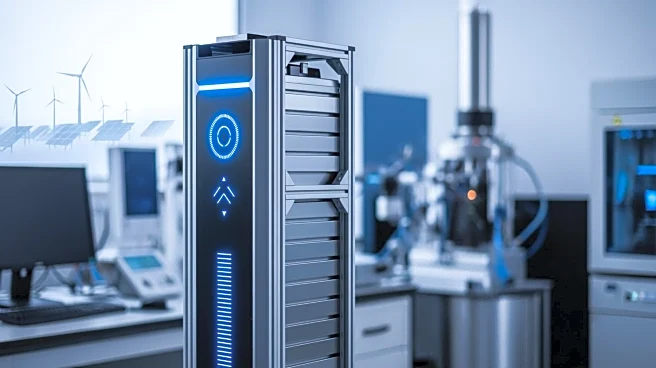What's Happening?
Researchers have conducted a comprehensive study on sodium-ion (SIB) pouch cell batteries, focusing on their performance under extreme temperature conditions. The study involved fabricating and testing
various batches of SIB pouch cells, assessing their electrochemical stability and energy storage capabilities at temperatures as low as -50°C. The research highlights the potential of SIBs as a viable alternative to lithium-ion batteries, particularly for renewable energy storage in harsh environments. The study demonstrated that SIBs maintain significant energy storage capacity even at low temperatures, with specific energy values of 74 Wh/kg at -25°C and 46 Wh/kg at -50°C. The research also explored the practical application of these batteries in real-world scenarios, such as charging with wind turbines and solar cells, showcasing their potential for off-grid renewable energy applications.
Why It's Important?
The development of sodium-ion batteries for extreme conditions is significant for the renewable energy sector, particularly in regions with harsh climates. These batteries offer a cost-effective and durable alternative to lithium-ion batteries, which are more sensitive to temperature fluctuations. The ability of SIBs to perform well in low temperatures could enhance energy storage solutions for remote and off-grid locations, providing reliable power sources where traditional energy infrastructure is lacking. This advancement could also support the integration of renewable energy sources, such as wind and solar, into the energy grid, promoting sustainability and reducing reliance on fossil fuels. Furthermore, the research paves the way for potential applications in space exploration, where extreme temperatures are a constant challenge.
What's Next?
Future research will likely focus on optimizing the materials and design of sodium-ion batteries to further improve their performance in extreme conditions. This could involve exploring new electrolyte formulations and electrode materials to enhance ion transport and reduce resistance. Additionally, scaling up the technology for commercial applications will be a critical step, requiring collaboration with industry partners to develop commercial-grade inverters and power management solutions. The successful deployment of SIBs in real-world scenarios, such as remote renewable energy installations and space missions, could drive further investment and innovation in this field.
Beyond the Headlines
The study of sodium-ion batteries in extreme conditions also raises important considerations regarding the environmental impact of battery production and disposal. As the demand for renewable energy storage solutions grows, ensuring the sustainability of battery materials and manufacturing processes will be crucial. The shift towards sodium-ion technology could reduce the reliance on scarce and expensive materials like lithium and cobalt, promoting a more sustainable and ethical supply chain. Additionally, the research highlights the potential for sodium-ion batteries to contribute to energy independence in remote and underserved communities, providing a reliable and sustainable power source that can withstand challenging environmental conditions.










